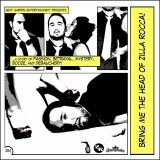The ten best Constantines songs
10) "Why I Didn't Like August '93" from The Believer June 2005 compilation The Constantines love to perform covers and this take on Elevator To Hell is probably my favorite of theirs. (Though their version of The Clash's "Police On My Back" has to vie for a close second.) I largely appreciate this song for its lyrics, which summon up too-clear associations of a specific and complicated chunk of my early twenties. But the band adds some great personal touches like the "Ahhhh" backup vocals that always earn a smile and the great poppy interplay between the guitar and the drums. Of all the songs in their catalogue, this is the one that could've, in some more interesting universe, gone on to be a radio hit. * MP3: "Why I Didn't Like August '93" - The Constantines 9) "No Ecstasy" from The Constantines From that opening rollicking drumroll, the track kicks off urgently and never looks back at the collateral damage. It makes perfect sense as it's all about the charge of rebellion, of growing up too fast, of getting far away from the curfews and detention and unending tedium of ordinary life. As the lyrics sagely recommend: "If all roads lead home, then build a new highway, build a new highway, build a new highway, and you run run run run run away." To the hectic rhythm of a conspiring guitar, that sounds like the most seductive plan that's ever been proposed. 8) "Blind Luck" from The Modern Sinner, Nervous Man EP "Blind Luck" is probably the best early indicator of the direction the Constantines would eventually take with Tournament of Hearts. It's more melodic and almost bouncy at times, even as the subject matter sticks to the defeated and downtrodden. It also hints at the focus on the working class Bry Webb would later take on. But even without its predictive power, "Blind Luck" remains an important deviation, confirming that the band had a range of talents and influences it was only beginning to tap into. * MP3: "Blind Luck" - The Constantines 7) "Hyacinth Blues" from The Constantines One of the great slow builds of our time, "Hyacinth Blues" starts out simmering and staggering before it finally explodes into a catatonic spelling bee. Every letter thrown out is another indictment, another damning epitaph, another shattered camera lens or torn-out microphone wire of the circling media vulture. It's also a nightly call-to-arms to the audience, to shout out alongside the band and register your rage in one tidal wave voice: "O-V-E-R-D-O-S-E." 6) "The Young and The Desperate" from Fits & Starts demo Although never officially released, this song contains all the wild-eyed restlessness and clench-fisted dissent that'd later spill over into the self-titled debut. "This is not our country!" howls an apoplectic Webb for every outcast, exile and heretic who's had to observe his surroundings from the refuges of night-hour parking lots and back alleys. His use of the collective "we" and "our" in this "love song for the dispossessed" is especially inspiring, considering that he's the only one of us who apparently knows how to breathe fire. * MP3: "The Young and The Desperate" - The Constantines 5) "Shine A Light" from Shine A Light Without "Shine A Light," I wouldn't know what 2003 sounded like. Without the syncopated handclaps and thumping bassline, the fuzzed-out intro and the chorus that dares you not to sing along, I wouldn't have had a custom-designed anthem to light that fire under my feet. Barreling into the solitude of a late Virginia summer, Shine A Light and its title track took over my CD player so definitively that they're tattooed on most of that half-year's memories. Even now, almost four years removed, I can't help hear it without nodding along and tapping out the bridge and contemplating giving up sleep until I can leave some permanent and frenzied dent on the world. 4) "Soon Enough" from Tournament of Hearts The Constantines have always been eminently quotable, but they've never hit upon a truth as simple or crystallized as the one at the core of "Soon Enough": "Work and love will make a man out of you." Dressed up in its finest country duds, it's almost profound enough to make the paycheck chase, forced co-worker chitchat and other daily humiliations feel bearable. It's also the Constantines' most visible symptom of an older, wiser band growing out of their idealism. On their first album, they would've advised ditching the job and running away; by their third effort, they're stuck punching the clock alongside us. * MP3: "Soon Enough" - The Constantines 3) "St. You" from The Constantines "St. You" will be the exit music to the film I've been writing in my head for years. Someone will be galloping off into the fuschia-streaked sunset or there'll be a last devastating aerial shot of an unsuspecting cityscape. Maybe there'll be a closeup on the lead actress's green eyes, closing in tighter and tighter until we fade into the oblivion of her pupils. It doesn't really matter what the closing image will be, because "St. You" is so steeped in pain and desire that it will crack hearts open upon contact. As the credits roll on by, the crowd will just sit there slack-jawed, soaking in this flawless song that explores the complicated communion between love and suffering. 2) "Young Offenders" from The Constantines Sweat was glazing all five of their faces at the end of another draining set. Their postures hung down a little more drooped. They looked sort of like marathon runners limping into their last miles. Even the crowd was exhausted from all the screaming and singing along thus far. But then the Constantines reemerged for an encore, with Doug MacGregor smacking out a driving beat to initiate "Young Offenders." The band gave it all they had again; the crowd joined in reflexively. Then Webb choked out a rabid "Can I get a witness?" and suddenly, it all felt so holy, like an uprising, like gospel in a mosh pit church, like a baptism by sweat in which we were all being restored. 1) "Nighttime/Anytime (It's Alright)" from Shine A Light A concentrated blast, these four minutes distill everything that makes the Cons so great: the rough, nasty crunch of guitars, the life-on-the-line vocals by Webb, the proclamations of revolt and/or passion, the breathless momentum that drags you complicitly into the heart of the mess. This song sounds like shredded knees and busted lips, like student rioters and police batons, like Bactene swabbed on fresh scrapes, like absolutely anything is possible and within reach, even for a wild bunch of hapless punks like us. * MP3: "Nighttime/Anytime (It's Alright)" - The Constantines [Buy The Constantines] [Buy Shine A Light] [Buy Tournament of Hearts] |































































